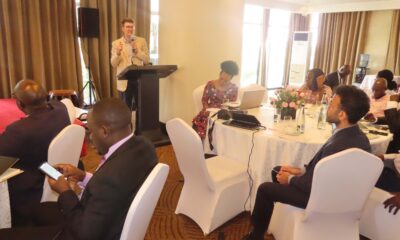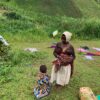Feature
How COVID19 Lockdown spiked teenage pregnancy in Uganda
By Sarah K Biryomumaisho, Stuart Tibaweswa & Miriam Watsemba
Northern Uganda continues to emerge out of the Lord’s Resistance Army conflict, which ruined its economy for close to two decades from 1986. But when the Covid-19 pandemic hit the Acholi Sub-region, it swept across desolate grounds battling to overcome the effects of protracted war, leaving yet another trail of destruction and despair. This story looks into one of the effects of the pandemic on teenagers, especially girls, who became victims of pregnancies and gender-based violence that have scarred their lives irreversibly.
A four-day visit to the three districts of Oyam, Lira, and Apac in Uganda’s Lango sub-region reveals the many facets of the effects of COVID-19, including teenage pregnancy, child marriages, and gender-based violence. Women abandoned their homes due to unending violence from their husbands especially during the lockdown, leaving teenage daughters in charge of homes.
These circumstances set the girls up as sitting ducks for sexual predators — right from their fathers, brothers, uncles, and grandparents to other men in their villages.
By the time the lockdowns were lifted, the situation had worsened in the sub-region to a point where one in every five households has a teenager that either has a child or is pregnant, as many girls were exposed to rape and defilement.
As a result, there is a 12-year-old in Adagawea village who was raped by a neighbor and is now raising a fellow child. There is a 14-year-old girl at Aputi village who was defiled and impregnated by her uncle after the mother left their home due to domestic violence. And then there is the 14-year-old who was defiled, but whose mother chose to take $197 (Shs700,000) from the suspect and abandon her daughter with a six-month-old child. We also met a 15-year-old at Byenek B village who was defiled and burnt by the suspect.
Those girls are just a handful of the 354,736 teenage pregnancies that were registered in 2020 across the country, and the 290,219 recorded from January to September 2021. Those figures translate to a monthly national average of 32,000.
Currently, there are no statistics indicating how many cases were recorded countrywide by the end of 2021, though the number is estimated to have surpassed that of 2020.
In 2020, the Lango sub-region alone registered some 13, 192 teenage pregnancies. The region comprises of the nine districts of Oyam, Lira, Kwania, Apac, Kole, Dokolo, Amolatar, Otuke, and Alebtong. By September 2021, the region had registered 25,812 teenage pregnancies.
Data from the National Population Council and the Uganda Bureau of Standards (UBOS), indicates that Lango has an estimated population of 2.3 million people as of July 2018, with over 1,332 schools. These include 871 Primary Schools, 118 Secondary Schools, 7 Technical Schools, 11 Tertiary Schools, 4 Teachers College Schools, 2 Special Needs Schools. However, most of the victims were in primary schools.
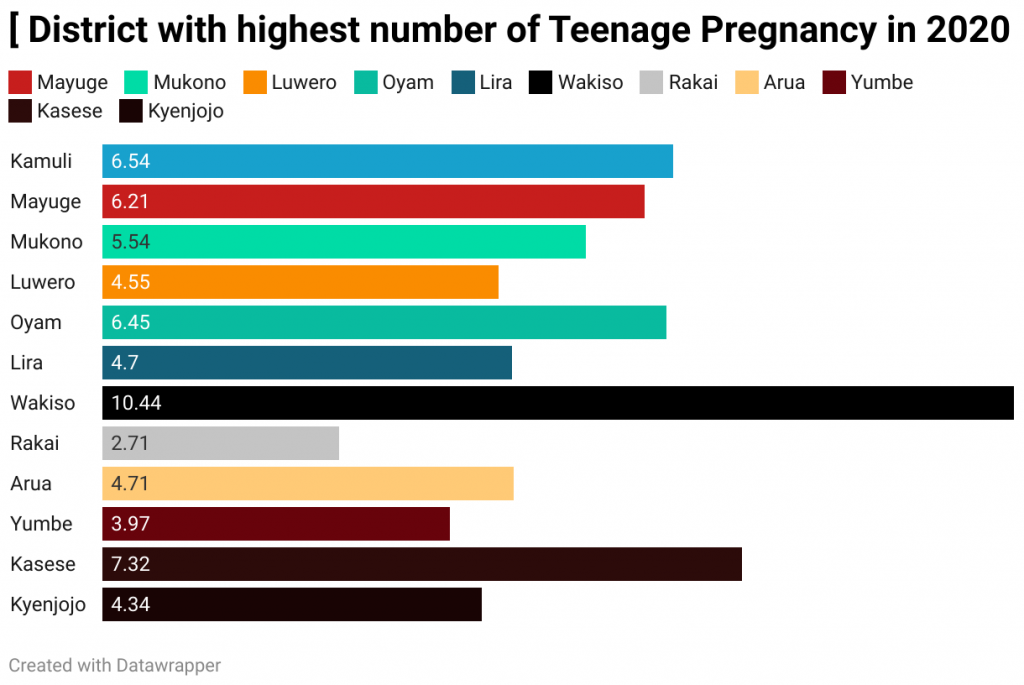
While schools were reopening in January 2022, most of the affected girls had no hope of returning to class. Instead, they have to stay home and fend for their children. According to Mr. Charles Twiine, Spokesperson of the Directorate of Criminal Investigations (CID), argues that some parents who come to report the cases do not have proof of age of the children or any evidence to cause arrest.
“A parent must prove the age of the defiled child and [that there was] penetration. They also must prove who did the penetration,” says Twiine. “The age can be proved by birth certificates or school registers for those who are in school.”
However, even after reporting the cases, Tumwine says some of the parents defeat the quest for justice for their children by conniving with suspects to help them get away with their crimes after receiving some money.
“They even help the perpetrators to getaway. And when the police come asking, they feign ignorance. Since we also have no evidence that the parents took money from suspects, they get away with the crime. But where a parent is caught red-handed taking money from the suspect or participating in child marriage, they too are arrested,” he explained.
While many parents and guardians blame the government for the increase in the number of teenage mothers due to the closure of schools for two years, some members of the community fault parents for being negligent and leaving their children unprotected from village vultures.
Scovia Awor, a resident of Abyenek A Okom Parish, Ngai Sub-county in Oyam district is taking care of her six-month-old granddaughter. She accuses the government of closing schools of an extended period, forcing her 16-year-old daughter Awor Ann (whose name has been changed so she can’t be identified since she’s a minor) to stay home full time.
Awor was raped and impregnated by her paternal uncle. Her mother believes that had her daughter been at school, she would not have been exposed to the uncle.
“My daughter was in P7 and all these years nothing like this had ever happened. If she had been in school, the suspect would not have had access to her, just like has been the case all these years. I blame the government for closing schools and making our children exposed to sexual vultures,” says Awor.
Betty Ecac, a resident of Adagawea village, Ogur Sub-county in Lira district, says her niece, Irene Amuge, had not involved herself in sexual acts until the lockdown started.
“She was a responsible girl whose daily routine involved going to school, coming back home, and helping us with home chores. Amuge had no time to mess around. But when the government closed schools, she was made redundant and started spending time with the man who defiled her. She was only 14 years old, and he took advantage of her naivety,” Acac argues.
However, Susan Awor, the LC1 Vice Chairperson of Adagawea village, blames parents for neglecting their duty to protect their children and spending all days in bars drinking alcohol.
“These parents should not blame the government; it is their responsibility to take care of their children,” argues Awor. “The country was on lockdown and they should have taken advantage [of that time] to spend time with their children and remind them of the dangers in society, including teenage pregnancy and diseases like HIV/AIDS. But most of them have abandoned this responsibility to schools and forgot that these are their children.”
The Girls
When President Yoweri Museveni announced the closure of all institutions of learning on March 18th 2020, Diana Adong (whose name has been changed so she can’t be identified since she’s a minor) was 12 years old and had just joined Primary four class at a school in Ogur Sub county, Lira district.
Adong was forced to stay home with her mother and the man who “inherited” the widow after the death of Adong’s father many years ago. For this 12-year-old girl, life was about to turn into a disaster she scarcely imagined happening, and her future dreams shattered.
Her mother, renowned in the village for her drunkenness, left Adong to fend for herself whenever she woke up to head to the bar every morning. On Monday, 11th May 2020, Adong’s mother sent her to the trading centre to buy soap and salt. On her way, she met the suspect, he shoved her into a nearby bush and defiled her.
Adong, whose breasts have still barely sprouted, is currently feeding a 10-month old baby, in between working eight hours a day in people’s gardens where she is paid less than $1 (UGX3,000). Despite police efforts to hunt down the suspect, he is still on the loose.
As if the rape ordeal was not bad enough, Adong delivered her baby under the most difficult of circumstances. Unable to afford hospitalization, Adong had her baby at home, with only her mother available to help.
“Many people told me to abort,” says Adong. “They were scared I would not manage to give birth to this child. But my mother refused and insisted that I keep the pregnancy. My mother also helped me give birth from home when it was time, because we did not have enough money to pay for hospital bills.”
Now aged 14, Adong does not think she will ever go back to school. And she is not alone. Most teenage pregnancy victims in Lango did not return to school even after delivering their babies.
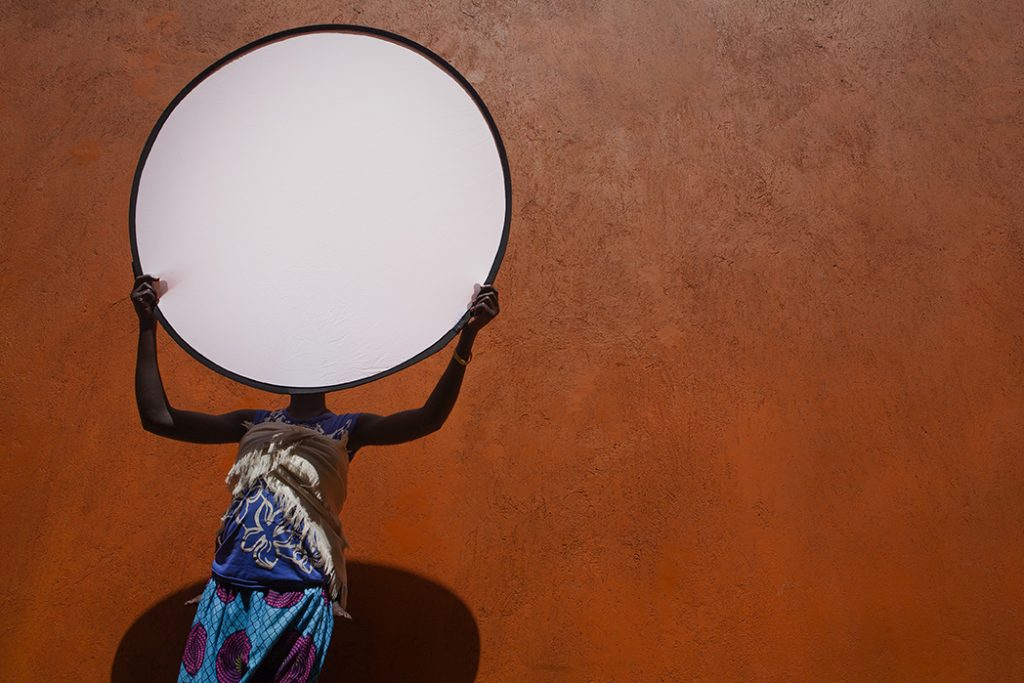
Irene Amuge was only 14 years old when she got pregnant in 2020, just after the country was put under lockdown. She went to the same school as Adong and was in Primary 5.
When the lockdown started, her 26-year-old “boyfriend”, as she refers to him, told her it was okay to consummate their relationship with sex. According to Amuge, they had intercourse twice and the man promised her everything would be okay. But that was only until she became pregnant, after the second sexual encounter.
Amuge told her mother about her predicament. The suspect was arrested, but a few days later, she saw him walking around free. She would later find out that her own mother had received $197 (Shs700,000) from the man to withdraw the case from the police.
Amuge’s mother has since abandoned her and her baby in one of the huts in their compound and got married to another man. Amuge is now at the mercy of her paternal aunt and other well-wishers in the community.
For Awor Ann, the story is not so different. We met the 15-year-old in Abyenek A village, Ngai Sub County in Oyam district. She recently sat her primary seven examinations and scored an aggregate 20, despite caring for her six-month-old baby whom she gave birth to in May 2021. She was allegedly raped by her uncle.
Awor’s abusive father beat up their mother every day until she left. However, this meant Awor was in charge of the family since she was the eldest child. The father abandoned the home, too, leaving his brother the responsibility to take care of his family. However, this granted the suspect easy access Awor’s hut. He raped her several nights until she became pregnant.
While Awor is now ready to join senior one, the man that raped her lives free, still in the same compound with them. The family sat and decided that reporting him to the Police was unnecessary and would ruin his reputation. Awor hopes to become a nurse someday and help mothers and children but for now, it seems like a far-fetched dream.
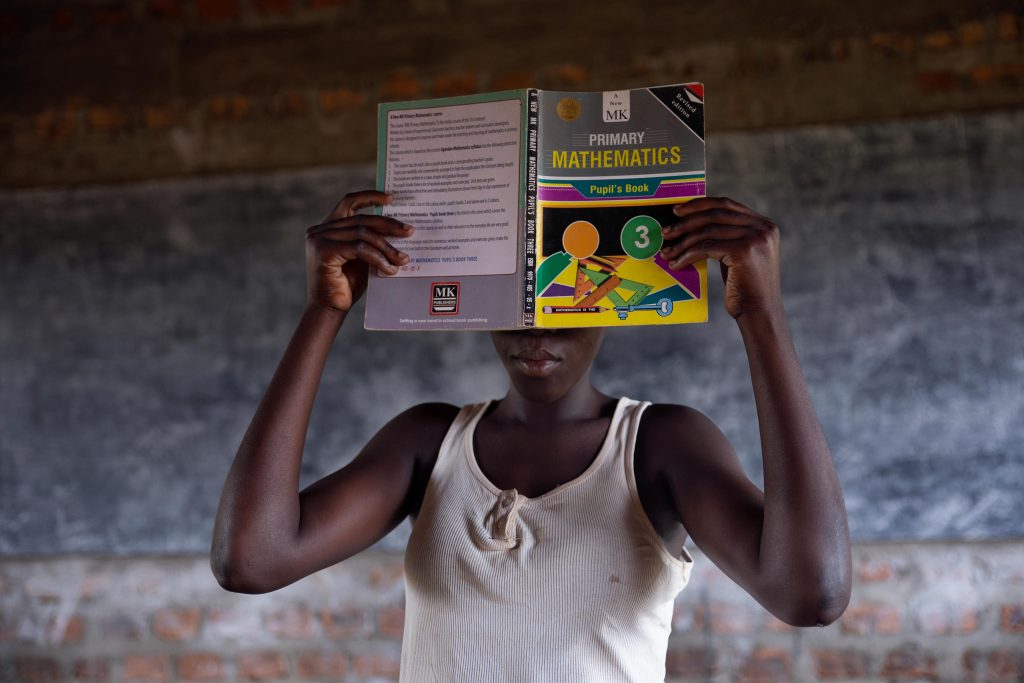
Government intervention
The government has come up with several interventions including the Guidelines for Prevention & Management of Teenage Pregnancy in a School setting in Uganda, formation of a multi-sectoral approach that includes partners like the Ministries of Education, Health, Gender, and other stakeholders, like religious and cultural intuitions with an aim to solve the problem.
According to State Minister for Education & Sports (Primary Education), Dr. Joyce Moriku Kaducu, the guidelines are meant to help schools understand how to deal with teenage mothers and ensure that the numbers do not increase. It provides for teachers, especially senior women and men to counsel learners about the dangers of engaging in early sex.
“We have already communicated that schools will form clubs to educate students to do the right things. We also have senior male and women teachers that have been designated and we have a guideline for them on how to handle these critical tender age children because this is a time when they transit to adulthood” said Moriku.
Dr. Fredrick Edward Makumbi, a professor in the Department of Epidemiology and Biostatistics-School of Public Health, College of Health Sciences, Makerere University-Kampala, supports the formation of clubs but prays that the approach will involve boys too.
“Those young girls who are in these clubs will now be seeing clear examples of classmates or friends who are struggling with pregnancy and school & they will say, ‘I don’t need to become pregnant because these are real-life examples.’ I think this could be one channel that can enlighten the young people,” says Prof Makumbi.
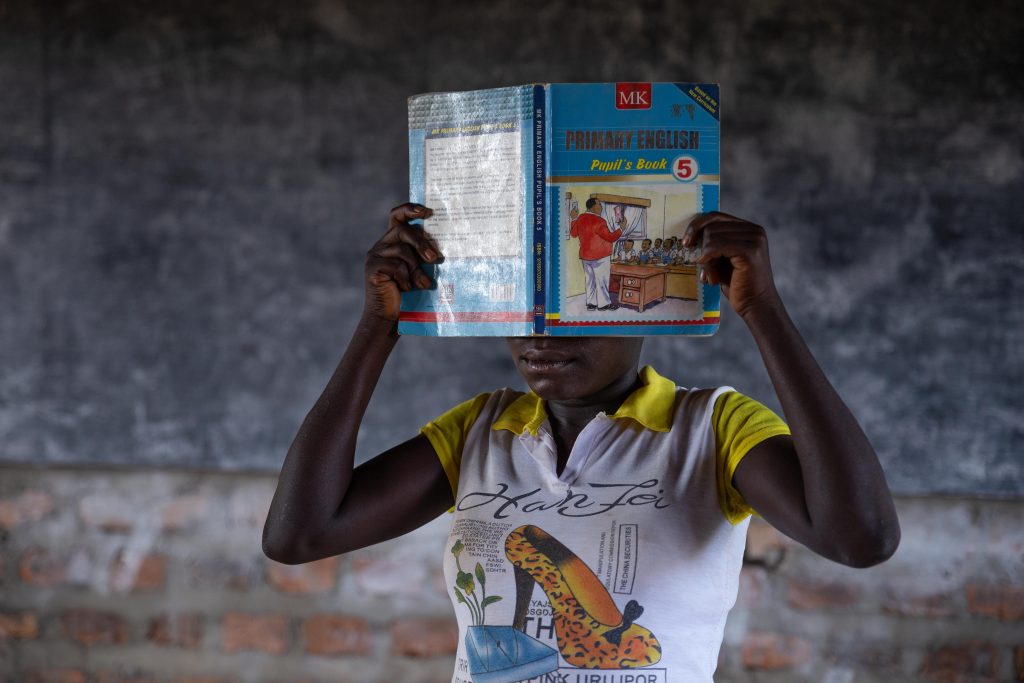
However, Rose Wakikoona an activist and lawyer with The Center for Health, Human Rights and Development (CEHURD), says the government has not dealt with this issue comprehensively.
“It is one thing to provide space for young teenage mothers to attend school while pregnant or breastfeeding, but have they put in place facilities that can be able to accommodate their special needs?” she wonders. “Because if we are looking at a school environment without a breastfeeding room, no school nurse who has been trained to handle pregnant women, no provision of folic acid and a resting room, a well-balanced diet, then I think the government has not prepared enough to accommodate the girls.”
In 2018, the Education Ministry drafted the National Sexuality Education Framework. The Framework suggested topics such as Sexuality and Human Development, Sexuality and Relationship, Sexuality and Sexual Behavior as well as Sexuality and Sexual Health.
However, the Framework was not put into effect due to the concerns raised by religious leaders, especially about starting this education at the age of 3 years. In November 2021, High Court Lady Justice Lydia Mugambe directed that a policy be made by the education ministry to guide the teaching and implementation of the Framework within the next two years.
But, Dr. Moriku says they have come up with guidelines on how to teach sexuality education within the morals of Ugandan culture.
“Ours is within the morals of our culture. The most powerful tool we have is information. But the information that is age-appropriate. You cannot start teaching the use of contraceptives/family planning to a four-year-old baby. What is relevant in the curriculum like teaching about reproductive organs at the right time, is what should be translated in the informal way of teaching them. We are not going to be compelled by the Court to do what some individuals want. We have a system and a legal department that will advise,” Dr. Moriku says.
However, Rose Wakikoona, a lawyer with The Center for Health, Human Rights and Development (CEHURD), one of the organizations in the case says the government must respect the High Court’s decision to integrate sexuality education into the curriculum or the organization will take it further.
“If the government ignores the Court order, definitely we shall take it further and ask Court for the execution of this judgment because we can be able to do that. The government of Uganda through the Attorney General has already filed a Notice of Appeal with the Court of Appeal against the Court judgment. For us, we are excited because this is an opportunity again to be able to amplify our voices that now is the time to provide this much-needed information to young people” says Wakikona.
Religious leaders
Meanwhile, members of the Inter-Religious Council of Uganda (IRCU), which brings together leaders of different religious denominations, have agreed that teen mothers should be allowed back into schools to finish their studies.
Dr. Joseph Sserwada, the presiding Apostle Born Again Faith and Co-Chair Inter-Religious Council of Uganda, blames the government for ignoring their advice on the approach of the sexuality education issue.
“At the beginning, we were consulted and we gave our ideas. We said that all school-going children from kindergarten up to about Primary four should be taught about hygiene, then from primary five, adolescence begins and naturally, these are now growing into mature people and depending on where they come from, they are beginning to enter puberty. So, we said those ones can be taught sexuality education. We do not support children being taught about using contraceptives or abortion like most NGOs are pushing the government to do.”

Cultural institutions
The Ministry of Education has also partnered with cultural institutions like the Buganda Kingdom to engage both girls and boys in counseling and reproductive health training. This is being done under programs like Buganda’s Ekisaakaate Kya Nabagereka (Royal Enclosure) Project, a camp that brings together girls and boys in the Buganda Kingdom aiming at nurturing them into responsible members of society who appreciate and harmonize both traditional and modern values.
It was started by the Queen of Buganda Kingdom, Sylvia Nagginda, sixteen years ago. According to Kintu Isaac, the manager of the Ekisaakaate Kya Nabagereka project, they were carrying out both virtual and physical lessons with the children during the lockdown. He also says they have dealt with several cases of teenage pregnancy during the last two years, including that of a sixteen-year-old girl who was defiled and impregnated by her own father Butambala district.
“This man threatened the girl that if she talked, he would kill her. So, she had feared to tell us, but she later opened up during one of the sessions. We immediately approached and talked to the district probation officer. To our shock, he informed us that he already had two other cases of the same man raping his biological children. We asked why they didn’t prosecute, but he says each time they arrest him, the man bribes his way out of jail,” Kintu says.
However, with the help of the Nabagereka Foundation and Justice Centres Uganda, this man is currently in jail. The foundation also takes victims into safe spaces to make sure they are well taken care of and away from their tormentors.
What can be done to end this problem?
During our visit, we realized that the largest cause of teenage pregnancy in Uganda was the lack of information by both children (boys and girls) and parents. The parents are scared to speak to their children about changes in their bodies and the consequences that come with engaging in sex at an early age.
Also, parents, especially mothers, have not been empowered to speak up against domestic violence. They are forced to leave their homes and expose their daughters to the dangers that come with such violent mother-less homes.
There is also a gap caused by the lack of NGOs in these areas, no safe spaces to shield the girls, nor skilling institutions to help the victims that may be thrown out of their parents’ homes for refusing to get into early marriages. This leaves the girls with no other choice, but to marry these older men brought by their parents.
Jennifer Alwoch, a freelance Women’s Rights Activist in Lira, says the government should promote awareness on Sexual Reproductive and Health Rights especially in the refugee camps and rural areas where most of the young girls have no access to information about the same.
“For example, on how to use family planning methods and where to find them. This should apply to only those over 18 years, the rest should abstain and forget about sex, or else the consequences await them. Sex education should be conducted in schools and at home by parents, they shouldn’t shy away from having conversations around sex with children. There are laws in place by government and that should be exercised on the perpetrators,” says Alwoch.
Rose Wakikoona a human rights activist says Ugandans should stop burying their heads in the sand, pretending that abstinence is the only way to end the teenage pregnancy pandemic.
“We want to pretend that abstinence is the only thing that we need to educate young people below the age of 18 while presuming that they are not having sex. But statistics from the Uganda Health Demographic Survey carried out in 2016 suggested that 22% of all teenagers reported having some form of sexual activity. But have we taught them how to manage their sexuality and the issue called sex?” asks Wakikoona.
She suggests that sexuality education should move from an abstinence-based curriculum to include issues of contraception, abortion, sexual minorities, and sexual violence. And that beyond giving them information, the teenagers should be given a chance to access all services, like access to condoms.
Dr. Makumbi says if the government is going to depend on teachers to act as counselors, they (teachers) should receive extra training on sexuality in order to know what information is appropriate for the different ages.
“Identify appropriate information for children in different classes. I think there should be a curriculum for training teachers, whether junior or senior, in the area of sexuality education. What should they be saying, when and to who. I don’t think you are going to assume because you are a teacher, you know. No, these are subspecializations” Dr. Makumbi argued.
Agnes Nantaba, a concerned parent, says the introduction of empowerment projects for women would go a long way to shield the girls from such problems, especially if mothers can be helped to learn skills that earn them a living to afford to keep their children in school.
She also wants the government to prioritize carrying out routine reproductive health camps in rural areas, especially in districts that are hard to reach, in order to train mothers how to talk to girls and boys about sexuality, as most fathers are not interested in the matter.
With the schools now reopened, there is hope among parents, government, and other stakeholders that the numbers will reduce, as was the case before the pandemic.
According to data from the Uganda Bureau of Statistics, the number of teenage pregnancies increased by 6.4% between 2017 and 2018, then reduced by 2.1% from 2018 to 2019, and then by about 0.9% between 2019 and 2020. Although there is no marked increase in teenage pregnancy between 2019 and 2020, however, it is worth noting there is a marked increase in teenage pregnancy in 2020 (49.3% that is 67/136).
This is an indication that indeed, closure of schools and having children at home for two years led to a surge in teenage pregnancies.
This reporting was supported by the International Women’s Media Foundation’s Gender Justice Reporting Initiative.







